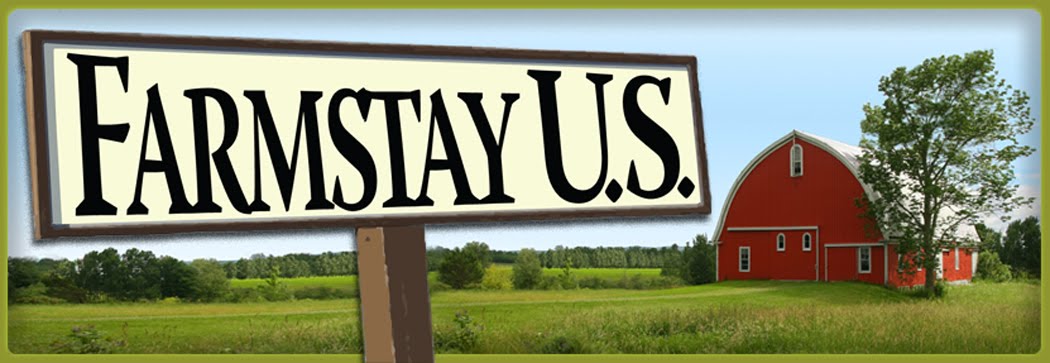Farm of Peace
The Farm of Peace sits on 150 rolling acres of field and forest in South Central Pennsylvania, at the end of a long dirt road. Renata Parrino, animal caretaker, farm stay host, and head cook for retreats, is one of five farm owners. The owners are all part of a Sufi spiritual community who bought the farm in 2003. After focusing for years on offering a Sufi retreat, they have opened their beautiful and secluded farm to non-denominational visitors, and all are careful to make guests of any background feel welcome. A Philadelphia lawyer, who leased the fields to his neighbors for hay, was the farm’s previous owner. Yet neighbors still refer to the farm as “the old Gray place,” for the family who farmed the land before, raising pigs and cattle and selling eggs in nearby Hancock, MD. Neighbors tell Renata, “you better love the land like the Grays did,” and the current owners’ reverence for the land and careful stewardship indicate that they do.
Twenty Tunis sheep with copper-colored faces and legs graze the land in rotation, with two donkeys serving as protection for the herd. Tunis is a multipurpose breed that can be used for milk, meat, and wool. This flock is raised for meat, although a community member also plans to start using their wool for weaving rugs. Only five or six sheep are slaughtered a year, just enough meat to use for retreats and to sell to friends and neighbors. There are plans to increase the herd size in the future. The farm also supports a flock of laying hens, and roughly 200 pastured broiling hens during the summer. A large vegetable garden and small orchard produce organic vegetables and fruit for guests and for a CSA that’s offered to nearby communities.
Three main buildings -- the original farmhouse, a new retreat center, and a new event barn -- are scattered around the property. The farmhouse, which has two rooms available for farm stay guests, was built in three parts. First the original log cabin was built roughly 100 years ago, then two additions were added in the 1950s and 1970s. The second main building, a remarkable straw bale, passive solar retreat center, was completed in 2008 thanks to community donations and a beautiful design by Philadelphia-based green architect Sigi Koko. The third main building is a large, non-insulated barn where the farm’s annual Unity Music Festival is held.The farm’s owners were inspired to open their farmhouse as a farm stay after meeting representatives of the Pennsylvania Farm Vacation Association at the annual Pennsylvania Farm Show. Hosting farm stay guests seemed like a good way to bring in additional income, to make use of the old farmhouse that they no longer used for retreats, and to invite more people to come and enjoy the farm. The Farm of Peace started accepting farm stay guests in 2009. Most visitors have been families with young kids, including a group of Russian tourists who visited twice, the second time with friends, to show them what a great time they had on a working American farm.
The old farmhouse is cozy, providing simple though comfortable accommodations in two rooms. The upstairs guest room is set up specifically to welcome families with young children, with play mats lining the floor and plenty of toys. Guests can walk the dirt roads or around the edges of the fields. Right outside the farmhouse, children can enjoy the swing set and sandbox, and can peek inside of the yurt when it’s not in use.
Breakfast ingredients are provided by the farm, most notably the fresh free-range eggs with their rich, creamy, deep orange yolks. Children are excited – and welcome -- to pet and feed the animals, and to collect eggs. As one guest remarked after sharing a meal with other member of the community, “being on a farm makes you see how hard it is to raise animals, it makes you think about food differently, and about the food chain. It makes you think about how much food you’re eating, and how much you’re wasting.”
The farm owners are considering opening the new retreat center to farm stay guests whenever retreats are not in session. Guests will be lucky if they do. The retreat center is warm and inviting, with massively thick, sixteen-foot-tall straw bale and cob walls, which act as a thermal mass that helps regulate the building’s temperature. The walls are hand-plastered and gently curved, and a geodesic dome provides the ceiling for a large meeting room. A wood-fired boiler heats the radiant floor. And a low-maintenance green roof populated by hardy sedges tops the flat part of the roof. A composting toilet and low-water flush toilets are available, and many of the guestrooms have private baths. The center has six bedrooms that sleep 14.
If you go:
Rooms start at $50/night, with a DIY breakfast included.
Farm of Peace
1212 Haven Lane
Warfordsburg, PA 17267
(717)573-2956
member, PA Farm Vacation Association
www.pafarmstay.com

















.jpg)